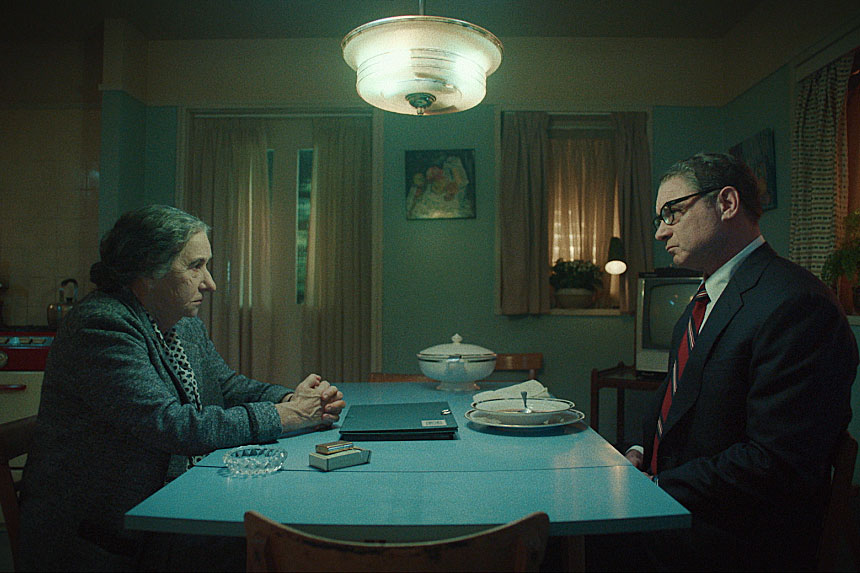Golda
⭐️ ⭐️ ⭐️ ⭐️
Rating: PG-13
Run Time: 1 hour 40 minutes
Stars: Helen Mirren, Liev Schreiber, Camille Cottin
Writer: Nicholas Martin
Director: Guy Nattiv
The most startling sound in Golda, a taut and magnificently acted drama set during the 1973 Yom Kippur War, is not that of gunshots, nor cannon fire, nor screaming soldiers, although there is plenty of that.
Instead, the aural sequence that will stick with you long after the final credits have rolled is one that’s nearly extinct nowadays: The metallic click of an opening cigarette lighter, the scratch of a spark wheel, the sizzle of fire igniting paper and tobacco, the tiny clang of the lid flipping closed.
It may be impossible to count the number of times Helen Mirren, channeling chain smoking Israeli Prime Minister Golda Meir, enacts that little ritual in Golda’s speedy 100 minutes. But there’s no underestimating the skill with which she does it: click, scratch, sizzle, clang…click, scratch, sizzle, clang. A counterpoint to Dascha Dauenhauer’s haunting musical score, the song of Golda’s lighter punctuates every scene of the film; a leitmotif that, in the hands of a masterful actor, manages to convey shades of authority, frustration, fear, and vulnerability.
Grandmotherly, brusque Golda Meir — born in Ukraine, raised in Milwaukee, forged on an Israeli kibbutz — remains one of the most intriguing yet little-examined figures of the 20th century. As the film notes in an afterword, while most of the world saw Meir as a political giant, Israelis held a more complicated view of her.
“Just remember,” the film’s Golda tells a young Ariel Sharon, “every political career ends in failure.”
Before Margaret Thatcher assumed the title, it was Meir who was proclaimed the political world’s Iron Lady. A woman in a man’s realm, she stared down political adversaries for decades in one of the planet’s most volatile regions, rising to her nation’s top position in the wake of the Six-Day War.
Golda opens with Meir, now retired from office, facing down yet another group of judgmental men: a panel convened to determine if she should assume blame for the large number of casualties Israel suffered in the course of the Yom Kippur conflict.
If the viewer has a bit of trouble concentrating on these proceedings, it’s understandable: We’re still catching our breath from our first look at Mirren as Meir, whose deeply creased face, caterpillar-like eyebrows, and gray hair — somehow managing to be both straggly and severely pulled back — made her one of the most instantly recognizable figures of her time.
There’s no denying that Mirren — whose ageless beauty threatened to undermine her Oscar-winning turn as Queen Elizabeth in The Queen — faces a challenge here, acting from behind a prosthetic face that occasionally seems less like Cicely Tyson in The Autobiography of Miss Jane Pittman and more like Kim Hunter in Planet of the Apes.
But there’s more to acting than great cheekbones and a perky nose, and Mirren proves again she is in full control of the thespian’s tool kit. Wisely, prosthetics designer Suzi Battersby has found a way to give Mirren autonomy over her deeply expressive eyes, freeing the star to register exasperation with her inquisitors, shrewd calculation with Henry Kissinger (a pretty perfect Liev Schreiber), grief at the sight of a young office stenographer learning of her brother’s battle death, and affection for her loyal aide-de-camp (warm Camille Cottin).
Most strikingly, Mirren finds a way to evoke a universe of emotions as Meir listens in on battlefield transmissions during a catastrophic rout in the desert. Oscar-winning director Guy Nattiv (Live Action Short, 2019) and writer Nicholas Martin (Florence Foster Jenkins) let us eavesdrop on the unfolding carnage, but I’m betting the scene would have been equally devastating had they chosen to simply show us Mirren’s eyes melting from hopefulness to despair to sheer horror.
Add to that Mirren’s adoption of a clipped, Midwestern delivery and the bent shuffle of a woman secretly enduring cobalt treatments for lymphoma (plus, of course, her virtuoso way with a cigarette lighter) and Mirren not only overcomes whatever limitations a heavily made-up face may impose — she transcends them.
It’s what great screen actors do.
Become a Saturday Evening Post member and enjoy unlimited access. Subscribe now




Comments
Terrific review! It certainly makes me want to see the film (and it is wonderful to see female actors being offered a wider range of roles….). But, also, how beautifully written! This passage was particularly gorgeous: “The metallic click of an opening cigarette lighter, the scratch of a spark wheel, the sizzle of fire igniting paper and tobacco, the tiny clang of the lid flipping closed.” Wonderful! It’s like a prose poem. Nicely done.
A good review of a great movie of a great leader.